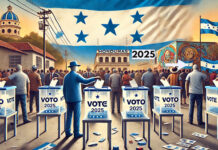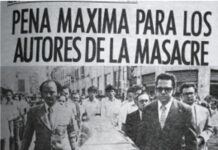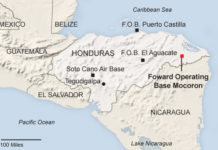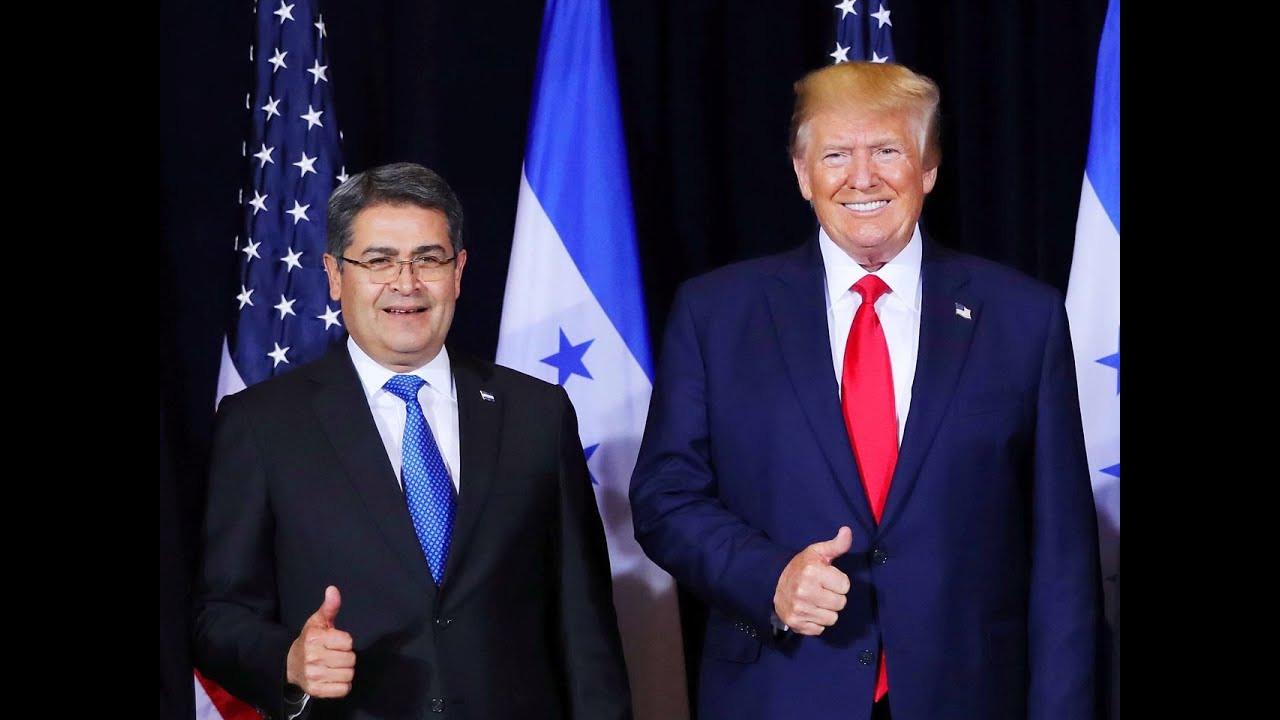
The answer is capitalism: Hernández opened Honduras to U.S. investors who value profits over people, including the American people
On March 8, an American jury in Federal District Court found former Honduran President Juan Orlando Hernández (JOH) guilty of conspiring to import cocaine into the United States and possessing and conspiring to possess “destructive devices,” including machine guns.
A string of witnesses testified during the trial that Mr. Hernández’s political success was fueled by drug proceeds funneled to him by cocaine traffickers whom he treated as business partners.
Prosecutors said that Mr. Hernández received millions of dollars from trafficking organizations in Honduras, Mexico and elsewhere, including from Joaquín Guzmán Loera, known as “El Chapo,” who was a Mexican drug lord and the former leader of the Sinaloa Cartel.
In return, prosecutors noted that Mr. Hernández allowed vast amounts of cocaine to pass through Honduras on their way to the U.S. in what amounted to a “cocaine superhighway.”
Hernández had boasted that he wanted to “stuff the drugs right up the noses of the gringos.”
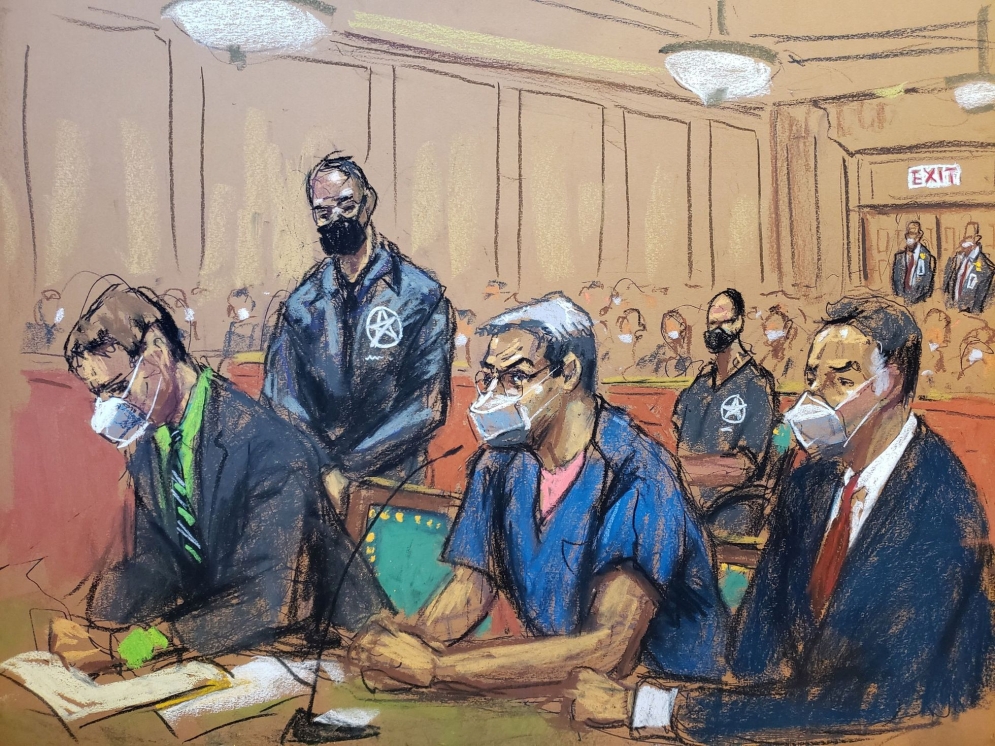
Given Hernández’s explicit intent to harm American citizens revealed in these latter comments, one would think that the American government would have declared him to be a national security threat and try to isolate or undermine his regime through sanctions or some other means.
The U.S. applied sanctions to Nicaragua and Venezuela and other left-wing governments that threatened the exploitative practices of U.S. corporations. Hernández’s government, however, was right-wing and friendly to U.S. business interests, and so he was feted at the White House, praised by Presidents Donald Trump and Joe Biden, and lavished with foreign aid.
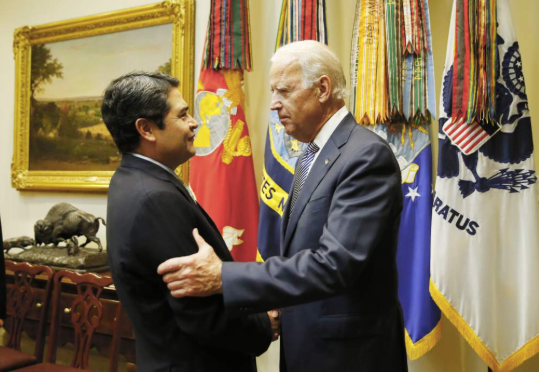
After Hernández signed a pact that gave broader leeway for the U.S. to deport migrants, then-President Donald Trump told Hernández: “I want to congratulate you and your country, and I want to tell you that you have done a fantastic job…My people working alongside you also tell us how much you love your country.”
Joe Biden was no better than Donald Trump. When Senators Jeff Merkley (D-OR), Patrick Leahy (D-VT) and Dick Durbin (D-IL) sponsored a bill in February 2021 imposing sanctions on Hernández for corruption and human rights abuses, and advocating the suspension of U.S. security assistance to Honduras and export licenses for coveted defense articles and munitions items sold to the Honduran police and military, Biden administration officials failed to support the bill—which lacked the numbers to pass—and refused to condemn the human rights violations carried out by U.S.-subsidized security forces in Honduras.
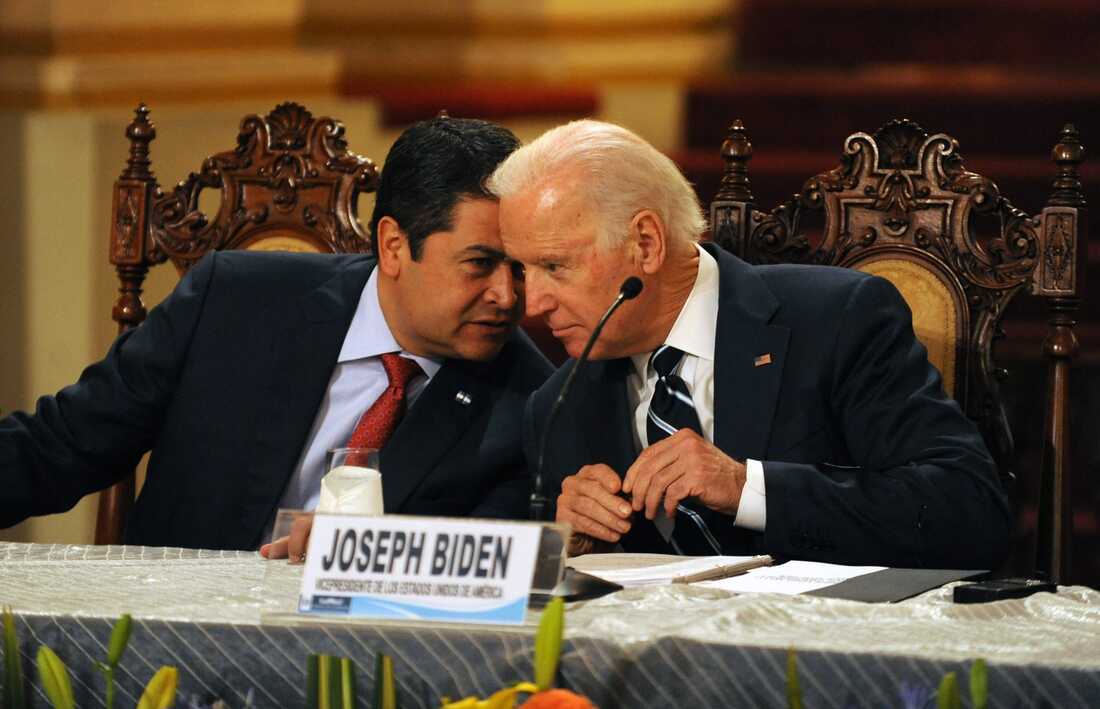
Reuters reported that the U.S. government provided Hernández with more than $50 million in anti-narcotics assistance and tens of millions more in security and military aid during his presidency from 2014 to 2022.
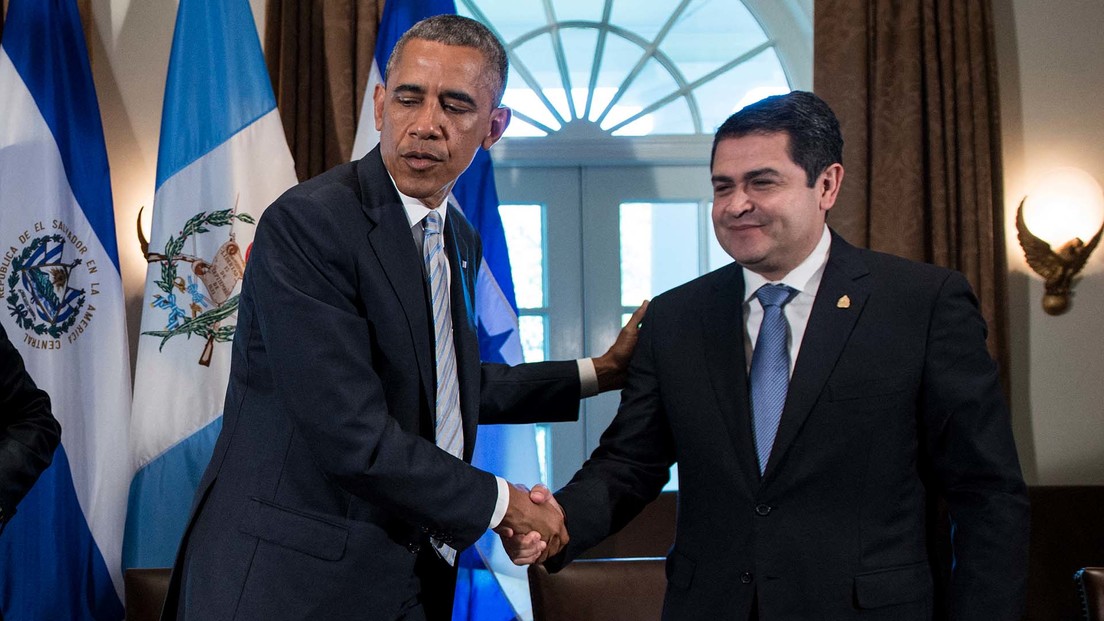
Millions of foreign aid dollars were channeled through the National Endowment for Democracy (NED), which was established in the 1980s to take over functions previously performed by the CIA. In 2018, the NED budget for Honduras was $735,124. Total U.S. foreign aid that year was $126.768 million.
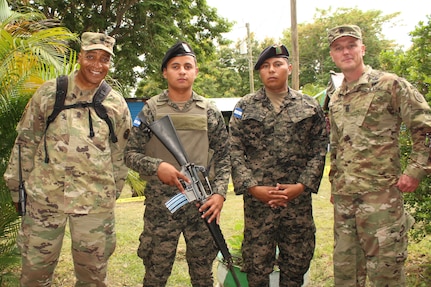
The U.S. military, which stationed more than 1,000 troops at the Soto Cano Air Base,[1] had a particularly close relationship with Hernández’s Security Minister, Julián Pacheco Tinoco. He was a 1979 graduate of the U.S. Army School of the Americas, with whom a Mexican drug trafficker, José Santos Peña, claimed to have met to discuss plans to move cocaine from Colombia through Honduras to the U.S.
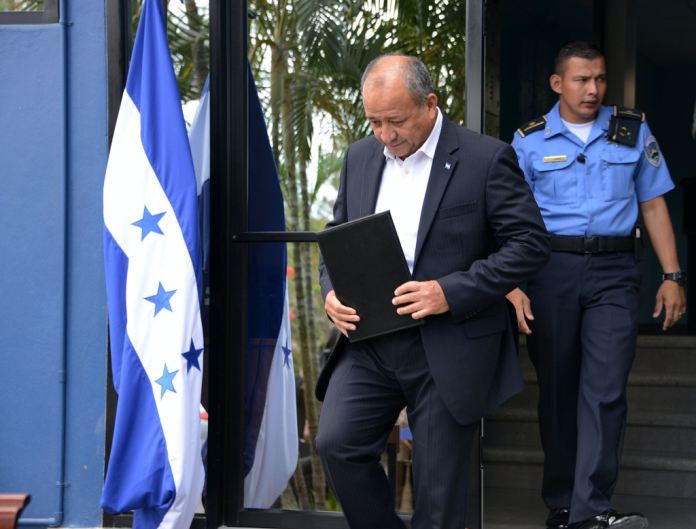
In 2019, Hernández’s brother Tony, a congressman from 2014 to 2018 and associate of “El Chapo” was found guilty of importing nearly 200,000 kilograms of cocaine into the United States. Many of the shipments were overseen by JOH’s chief of National Police, Juan Carlos Bonilla Valadares (aka “El Tigre”), whom Tony Hernández said was “very violent,” and “trusted with special assignments, including murders.”
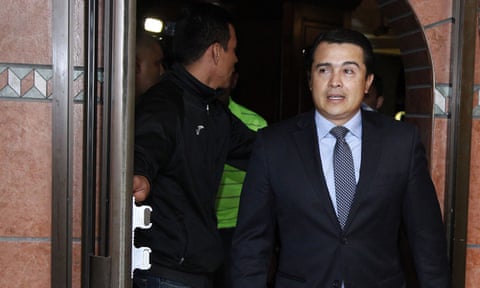
Hondurans’ anger at American backing for Hernández’s venal regime was evident in 2019 when protesters set fire to the front gate to the U.S. embassy.
Ismael Moreno Coto, a Jesuit priest, told NPR in March 2021 that “Hernández has held onto power because he has support from Southern Command, the State Department and the White House.”
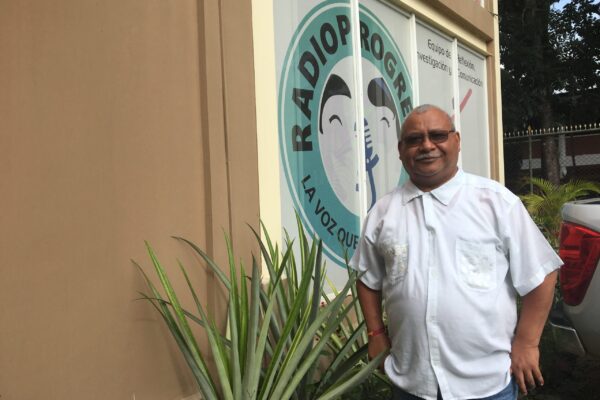
Coming to Power on Heels of U.S.-Backed Coup
Hernández was described by journalist Dana Frank as a “formidable charmer” who “looked like he was born wearing a clean white shirt” but was really a “dangerous thug,”[2]
His rise to power resulted from a 2009 Obama administration-backed coup, which Hernández supported as head of the Honduran Congress.[3]
The target of the coup, elected President José Manuel Zelaya (2006-2009), had raised the minimum wage, increased teacher pay, opened the door to restoring the land rights of small farmers, and joined the Hugo Chávez-led Bolivarian Alliance for the Americas (ALBA), which aimed to integrate Latin American economies independent of the U.S.
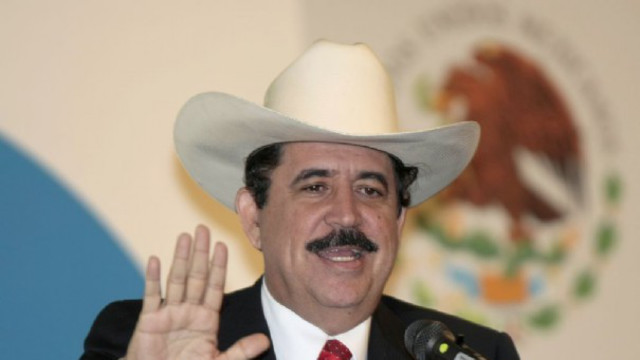
Miguel Angel, a political activist in his 20s who fled Honduras after the coup, told CovertAction Magazine that “Zelaya was the best president Honduras had ever had,” one who “followed through on his campaign promises.” The latter proved to be his undoing as the wealthy “didn’t like the fact that a man of power gave a plate of food to the poor.”
The wealthy favored Hernández more, as did U.S. leaders, because he moved to privatize state-run industry and open Honduras to private investment in line with the goals of the 2004 Central America Free Trade Agreement (CAFTA), which included a requirement that “labor practices do not disadvantage competition”—thus forcing Honduras’s government to cut the few protections, wages and benefits they provide to workers.
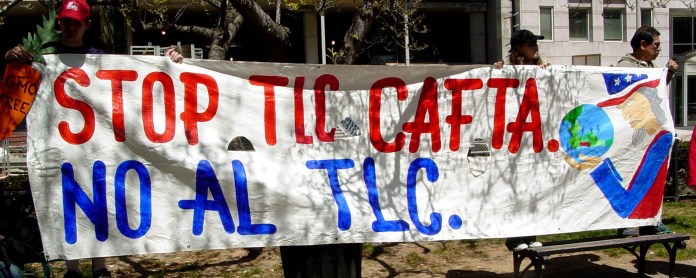
U.S. direct foreign investment in Honduras totaled over $2.42 billion in 2015 and more than 200 U.S. companies operated there in 2022, according to the U.S. State Department.
In July 2014, Obama and Biden invited Hernández and other Central American leaders to the White House to push the Alliance for Prosperity, a $1 billion investment in the region’s economic development and security assistance.[4] Dana Frank says that “this is the clearest marker of Biden and Obama saying we are going to pour money in and support this regime,” overlooking evidence of corruption.
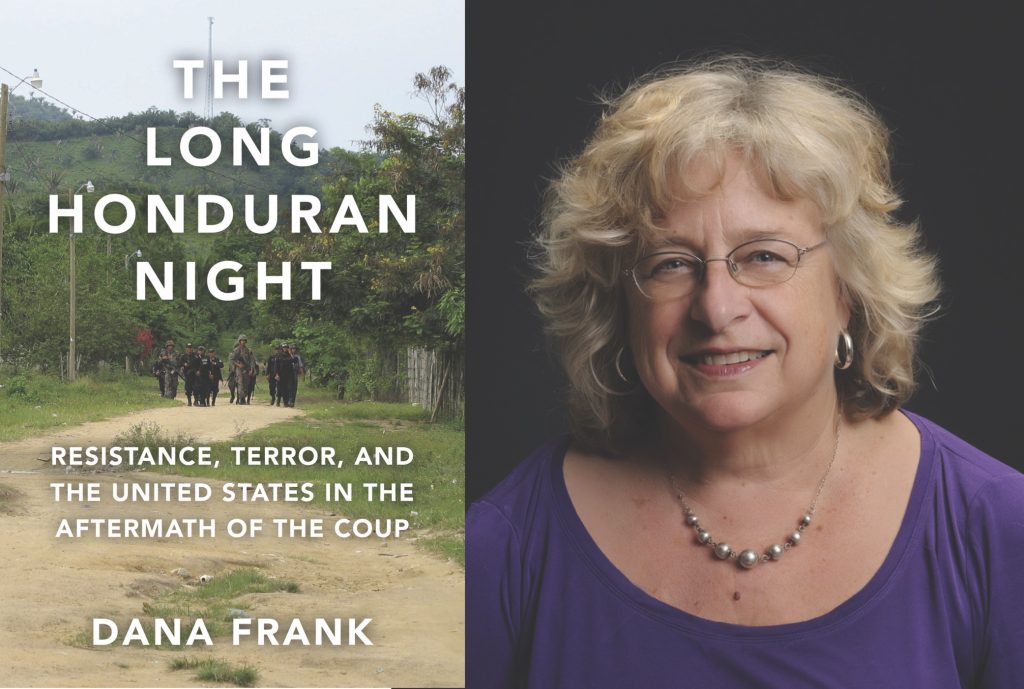
Hernández’s push for privatization in the health care and education sectors prompted large-scale demonstrations against him that were suppressed by Honduras’s military police, which were trained by the FBI—another clear example of U.S. complicity in Hernandez’s human rights abuses.
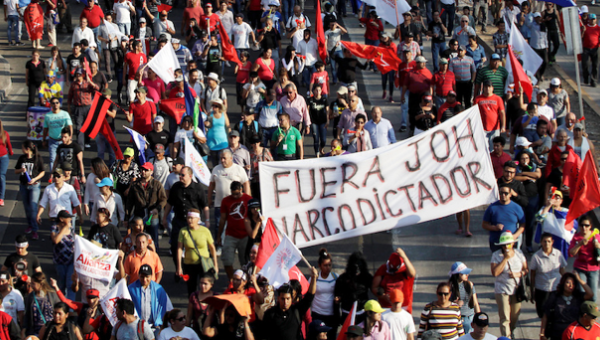
The U.S. is a capitalist country that has always placed profits over people, and supported leaders like Hernández’s who are seen as better alternatives to the left.
Historically, the U.S. has preferred that its own allies control the drug trade, keeping the profits out of the hands of rivals and left-wing groups.[5]
If the U.S. favorite becomes a political liability because his corruption is exposed, then the U.S. may throw him under the bus—like they have now done with Hernández—but there will always be somebody else waiting in the wings.

-
Southern Command also had a forward operating base at Mocoron. ↑
-
Dana Frank, The Long Honduran Night: Resistance, Terror, and the United States in the Aftermath of the Coup (Chicago: Haymarket Books, 2018), 146. ↑
-
Frank, The Long Honduran Night, 146. ↑
-
As President Biden adopted an expanded program under which Honduras and other Central American nations were to “end [any] restrictions on foreign corporations dominating their industries and markets” and “remove any tariffs or economic protectionist measures.” Journalist Ben Norton wrote that these are exactly the kinds of policies that “have devastated local economies in Latin America fueling poverty, unemployment and mass migration.” ↑
-
See Douglas Valentine, The Strength of the Pack: The Personalities, Politics and Espionage Intrigues that Shaped the DEA (Walterville, OR: TrineDay, 2010). The CIA uses profits from the drug trade to finance black operations. ↑
CovertAction Magazine is made possible by subscriptions, orders and donations from readers like you.
Blow the Whistle on U.S. Imperialism
Click the whistle and donate
When you donate to CovertAction Magazine, you are supporting investigative journalism. Your contributions go directly to supporting the development, production, editing, and dissemination of the Magazine.
CovertAction Magazine does not receive corporate or government sponsorship. Yet, we hold a steadfast commitment to providing compensation for writers, editorial and technical support. Your support helps facilitate this compensation as well as increase the caliber of this work.
Please make a donation by clicking on the donate logo above and enter the amount and your credit or debit card information.
CovertAction Institute, Inc. (CAI) is a 501(c)(3) non-profit organization and your gift is tax-deductible for federal income purposes. CAI’s tax-exempt ID number is 87-2461683.
We sincerely thank you for your support.
Disclaimer: The contents of this article are the sole responsibility of the author(s). CovertAction Institute, Inc. (CAI), including its Board of Directors (BD), Editorial Board (EB), Advisory Board (AB), staff, volunteers and its projects (including CovertAction Magazine) are not responsible for any inaccurate or incorrect statement in this article. This article also does not necessarily represent the views the BD, the EB, the AB, staff, volunteers, or any members of its projects.
Differing viewpoints: CAM publishes articles with differing viewpoints in an effort to nurture vibrant debate and thoughtful critical analysis. Feel free to comment on the articles in the comment section and/or send your letters to the Editors, which we will publish in the Letters column.
Copyrighted Material: This web site may contain copyrighted material the use of which has not always been specifically authorized by the copyright owner. As a not-for-profit charitable organization incorporated in the State of New York, we are making such material available in an effort to advance the understanding of humanity’s problems and hopefully to help find solutions for those problems. We believe this constitutes a ‘fair use’ of any such copyrighted material as provided for in section 107 of the US Copyright Law. You can read more about ‘fair use’ and US Copyright Law at the Legal Information Institute of Cornell Law School.
Republishing: CovertAction Magazine (CAM) grants permission to cross-post CAM articles on not-for-profit community internet sites as long as the source is acknowledged together with a hyperlink to the original CovertAction Magazine article. Also, kindly let us know at info@CovertActionMagazine.com. For publication of CAM articles in print or other forms including commercial internet sites, contact: info@CovertActionMagazine.com.
By using this site, you agree to these terms above.
About the Author

Jeremy Kuzmarov holds a Ph.D. in American history from Brandeis University and has taught at numerous colleges across the United States. He is regularly sought out as an expert on U.S. history and politics for radio and TV programs and co-hosts a radio show on New York Public Radio and on Progressive Radio News Network called “Uncontrolled Opposition.”
He is Managing Editor of CovertAction Magazine and is the author of six books on U.S. foreign policy, including Obama’s Unending Wars (Clarity Press, 2019), The Russians Are Coming, Again, with John Marciano (Monthly Review Press, 2018), Warmonger. How Clinton’s Malign Foreign Policy Launched the U.S. Trajectory From Bush II to Biden (Clarity Press, 2023); and with Dan Kovalik, Syria: Anatomy of Regime Change (Baraka Books, 2025).
Besides these books, Kuzmarov has published hundreds of articles and contributed to numerous edited volumes, including one in the prestigious Oxford History of Counterinsurgency .
He can be reached at jkuzmarov2@gmail.com and found on substack here.

